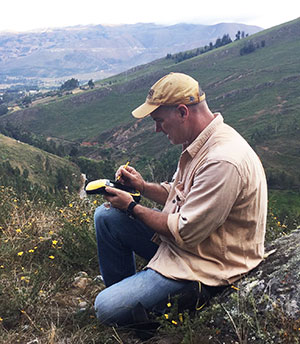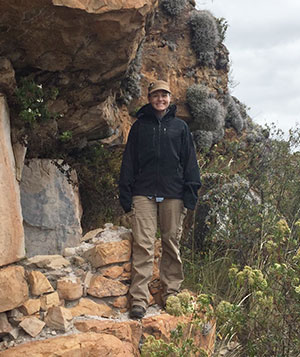UWs Toohey, Murphy Receive NSF Grant to Study Archaeological Evidence of Economic Inequality in Peruvian Andes
Published January 24, 2022

Two University of Wyoming anthropology professors recently received a five-year National Science Foundation (NSF) grant to conduct archaeological research in the northern Peruvian Andes focused on understanding the origins and development of economic inequality in emerging complex societies.
Associate Professor Jason Toohey and Professor Melissa Murphy received the NSF grant worth $145,164 for their project titled “Investigating the Origins of Inequality in the Cajamarca Highlands of the Northern Andes of Peru.” The grant began last Sept. 1 and runs through Sept. 1, 2026.
The research will challenge common impressions that inequality has always been present, is unchanging and inevitable. Toohey and Murphy will focus on the theory that intensities of economic and social inequality are instead highly situational and dynamically linked to broader social change, leadership strategies and interregional interaction.
“We will investigate the origins and development of economic inequality by carefully comparing house size, house construction quality and elaboration, household artifacts and burial architecture at the large site of Callacpuma in the Cajamarca Basin of northern Peru,” Toohey says. “Previous researchers have demonstrated that these types of archaeological data inform about how wealth between households is distributed and are, therefore, good proxies to measure inequality in the past.”
Callacpuma was occupied for about 1,500 years, so the statistical analysis of these variables and their change during this time will allow the two to closely examine the origins and development of economic inequality and its ebbs and flows through 15 centuries. The Peruvian Andes is one of only six places on earth to have witnessed the indigenous development of bureaucratically complex societies, or “the state.”
“It is a rare and perfect place to study these long-term economic and social processes so pronounced and important in the modern world,” Murphy says.
Large samples of domestic structures and burials will be excavated, and comparative statistical analysis will be applied to variables linked to economic inequality including house size and internal complexity; domestic artifacts associated with those houses; and the organization and complexity of mortuary architecture through time.

To date, much of the archaeological research into inequality in the past has focused on Mesoamerica, North America and Eurasia. Scholars who studied in those locations found that there were greater wealth disparities in Eurasia than in the Americas over the last 10,000 years. However, Toohey and Murphy believe that the data sets are incomplete, and their research will be the first of its kind to be conducted in the Andes.
The two say the research is relevant because world economic inequality and wealth disparity have increased exponentially in the last 30 years. This has led to a belief among many that great inequality has always been the case; that it is inevitable in human societies; and that it is irreversible.
“These are modern assumptions,” Toohey says. “This popular understanding that, on one hand, early hunter-gatherers lived perfectly egalitarian lives and, on the other, that with the onset of agriculture, settled lifestyles and private property brought with them wealth disparity and irreversible inequality is questioned in some current research, including a recent popular science text titled ‘The Dawn of Everything’ by Dr. David Graeber and Dr. David Wengrow.”
“Our research will make a major contribution to the nascent body of research seeking to better understand the origins, development and evolution of economic inequality in the world,” Murphy says. “Archaeological research, uniquely suited to investigate long-term processes like these, provides material evidence and data-driven understandings of the nature of inequality both in the past and today.”
The grant will support one UW graduate student through international travel and summer stipends for two years.
“It is possible that we will run an international field school for UW undergraduates during these investigations, something we have done previously in 2012, 2015 and 2018,” Toohey says. “UW undergraduates will have the opportunity to conduct independent research projects associated with our investigations, either in the field with us in Peru or in our laboratories at UW.”

